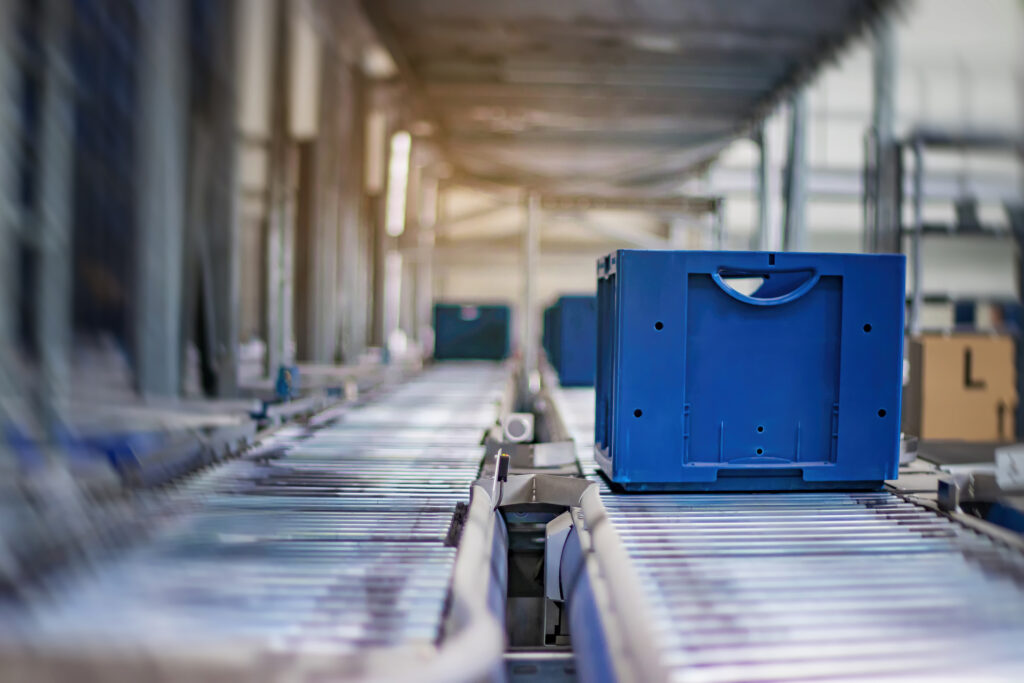Table of Contents
Warehouse conveyors are the backbone of modern warehousing and logistics, revolutionizing how goods are moved, sorted, and handled. At Lafayette Engineering, we understand the pivotal role these systems play in streamlining operations, enhancing productivity, and ensuring safety. In this blog, we’ll explore the significance of conveyor systems, their various types, benefits, and how Lafayette Engineering can assist you in implementing the most effective solutions for your needs.
The Importance of Conveyor Systems in Warehousing
Conveyor systems are indispensable in today’s fast-paced logistics environment. These systems offer a multitude of advantages that contribute to the efficiency and effectiveness of warehouse operations. Here are ten reasons why they are essential:
- Increased Productivity Conveyors automate the movement of goods, significantly reducing manual labor. This leads to faster processing times and higher throughput, allowing businesses to handle more products in less time.
- Enhanced Accuracy Automated systems reduce human errors in sorting and transporting goods. This ensures that products are accurately placed and shipped, improving customer satisfaction and reducing returns.
- Improved Safety By automating the transport of heavy and bulky items, conveyors minimize the risk of workplace injuries. This creates a safer working environment and reduces downtime due to accidents.
- Space Optimization Conveyor systems can be designed to maximize the use of available space. Vertical and overhead systems, for instance, utilize otherwise wasted vertical space, increasing storage capacity.
- Cost Efficiency While the initial investment in these systems can be significant, the long-term savings on labor costs, reduced errors, and increased efficiency make them a cost-effective solution.
- Scalability Conveyor systems can be easily scaled to match the growth of your business. Whether expanding your warehouse or increasing your product lines, conveyors can be adapted to meet new demands.
- Consistent Workflow These systems provide a steady and consistent flow of goods through various stages of processing, ensuring that operations run smoothly and without interruptions.
- Versatility Different types of conveyors can handle a wide range of products, from small packages to large pallets. This versatility makes them suitable for various industries, including retail, manufacturing, and distribution.
- Energy Efficiency Modern conveyor systems are designed with energy efficiency in mind, utilizing advanced technologies that reduce power consumption and environmental impact.
- Real-Time Tracking Integrating conveyors with warehouse management systems (WMS) allows for real-time tracking and monitoring of goods. This improves inventory management and provides valuable data for decision-making.
Types of Conveyor Systems for Warehousing
Conveyor systems come in various types, each designed to meet specific needs. Some of the most common types include:
- Belt Conveyors: Ideal for transporting items of various sizes and shapes, belt conveyors are versatile and widely used in many industries.
- Roller Conveyors: These are suitable for moving heavier items and can be powered or gravity-driven.
- Pallet Conveyors: Designed for moving pallets, these conveyors are robust and can handle significant weight.
- Overhead Conveyors: These conveyors utilize vertical space and are perfect for transporting items above ground level.
- Automated Guided Vehicles (AGVs): While not traditional conveyors, AGVs are mobile robots that move goods throughout the warehouse, offering flexibility and automation.
Benefits Beyond the Basics
While the primary benefits of these systems include increased productivity, enhanced accuracy, and improved safety, there are additional advantages that further underscore their value in warehouse operations:
Streamlined Processes Automated conveyor systems streamline various processes within a warehouse, from receiving goods to dispatching them. This leads to a more organized and efficient operation, reducing the time products spend in the warehouse.

Improved Employee Morale By taking on the physically demanding tasks, conveyors allow employees to focus on more skilled activities. This not only improves morale but also reduces fatigue and the likelihood of injury.
Environmental Impact Energy-efficient designs in modern systems help reduce the overall carbon footprint of a warehouse. By using less power and optimizing operations, these systems contribute to a greener, more sustainable operation.
Data-Driven Decisions Real-time tracking and monitoring provide valuable data that can be used to make informed decisions about inventory management, process improvements, and overall operational strategies.
Future-Proofing Operations Investing in modern conveyors positions a warehouse for future growth and technological advancements. With scalable and upgradable solutions, businesses can adapt to changing market demands and technological innovations.
Frequently Asked Questions (FAQs)
Q1: What are warehouse conveyors? A1: Warehouse conveyors are mechanical systems used to transport goods within a warehouse. They automate the movement of products, enhancing efficiency, accuracy, and safety.
Q2: What types of warehouse conveyors are available? A2: Common types of conveyors include belt conveyors, roller conveyors, pallet conveyors, overhead conveyors, and automated guided vehicles (AGVs).
Q3: How do warehouse conveyors improve productivity? A3: They automate the transport and sorting of goods, reducing manual labor and processing time, which increases overall productivity.
Q4: Are warehouse conveyors cost-effective? A4: Yes, while the initial investment may be high, the long-term savings on labor, reduced errors, and increased efficiency make these systems a cost-effective solution.
Q5: Can warehouse conveyors be customized? A5: Absolutely. Conveyor systems can be tailored to meet the specific needs of a business, including size, layout, and operational requirements.
Q6: How do these systems enhance safety? A6: By automating the movement of heavy and bulky items, conveyors reduce the risk of workplace injuries, creating a safer working environment.
Q7: Can conveyor systems be integrated with existing warehouse management systems (WMS)? A7: Yes, modern conveyor systems can be integrated with WMS to provide real-time tracking and monitoring of goods, improving inventory management and operational efficiency.
Q8: What industries benefit from warehouse conveyors? A8: These systems are beneficial in various industries, including retail, manufacturing, distribution, food and beverage, and pharmaceuticals.
Q9: How do I choose the right conveyor system for my warehouse? A9: Selecting the right conveyor system depends on factors such as the type of goods, warehouse layout, and operational requirements. Consulting with experts like Lafayette Engineering can help determine the best solution.
Q10: What services does Lafayette Engineering offer for warehouse conveyors? A10: At Lafayette Engineering, we provide comprehensive services for conveyor systems, including design, installation, maintenance, and customization. Our expertise ensures that your systems meet your specific needs and enhance your warehouse operations.
Lafayette Engineering’s Expertise
At Lafayette Engineering, we specialize in designing and implementing advanced conveyor systems tailored to your unique requirements. Our team of experts works closely with you to understand your operational needs and deliver solutions that optimize efficiency, accuracy, and safety.
Our services include:
- Custom Design: We design systems that fit your warehouse layout and operational needs.
- Installation: Our experienced technicians ensure seamless installation of your systems.
- Maintenance: We provide ongoing maintenance services to keep your systems running smoothly.
- Upgrades and Retrofits: We can upgrade and retrofit existing systems to enhance their performance and extend their lifespan.
For more information on how we can help you with warehouse conveyors, visit our website Lafayette Engineering and connect with us on LinkedIn.
Warehouse conveyors are a game-changer in modern logistics, offering numerous benefits that enhance operational efficiency. By partnering with Lafayette Engineering, you can ensure that your warehouse is equipped with the best systems, designed to meet your specific needs and drive your business forward.



